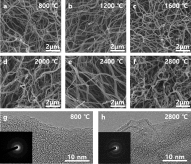
Carbon-based air cathodes are considered the ideal choice for Li–O2 batteries. However, the parasitic reaction on the carbon surface remains a critical hurdle to progress toward practical Li–O2 batteries. To address this issue, an in-depth understanding of the effect of surface chemistry is needed as it is a key factor determining the electrochemical performance of Li–O2 batteries. In this study, to elucidate the relationship between the surface characteristics of carbon and the electrochemical performance of a Li–O2 battery, we prepared a series of porous carbon nanoweb electrodes with systematically controlled surface properties. We then closely investigated the effect of the surface chemistry of carbon on the electrochemical performance of the Li–O2 battery. The key factors greatly contributing to the performance were determined to be the degree of graphitization and the density of oxygen functional groups on the carbon surface. These factors have a strong effect on the initial reaction route for Li2O2 formation, naturally resulting in large differences in the electrochemical properties such as the capacity, cyclability, efficiency, and Li2O2 yield. We define the relationship between the surface properties and key performance factors, and suggest the ideal conditions for a carbon electrode for Li–O2 batteries. Our demonstration will help guide the future design of ideal carbon-based air cathodes for practical Li–O2 batteries.
